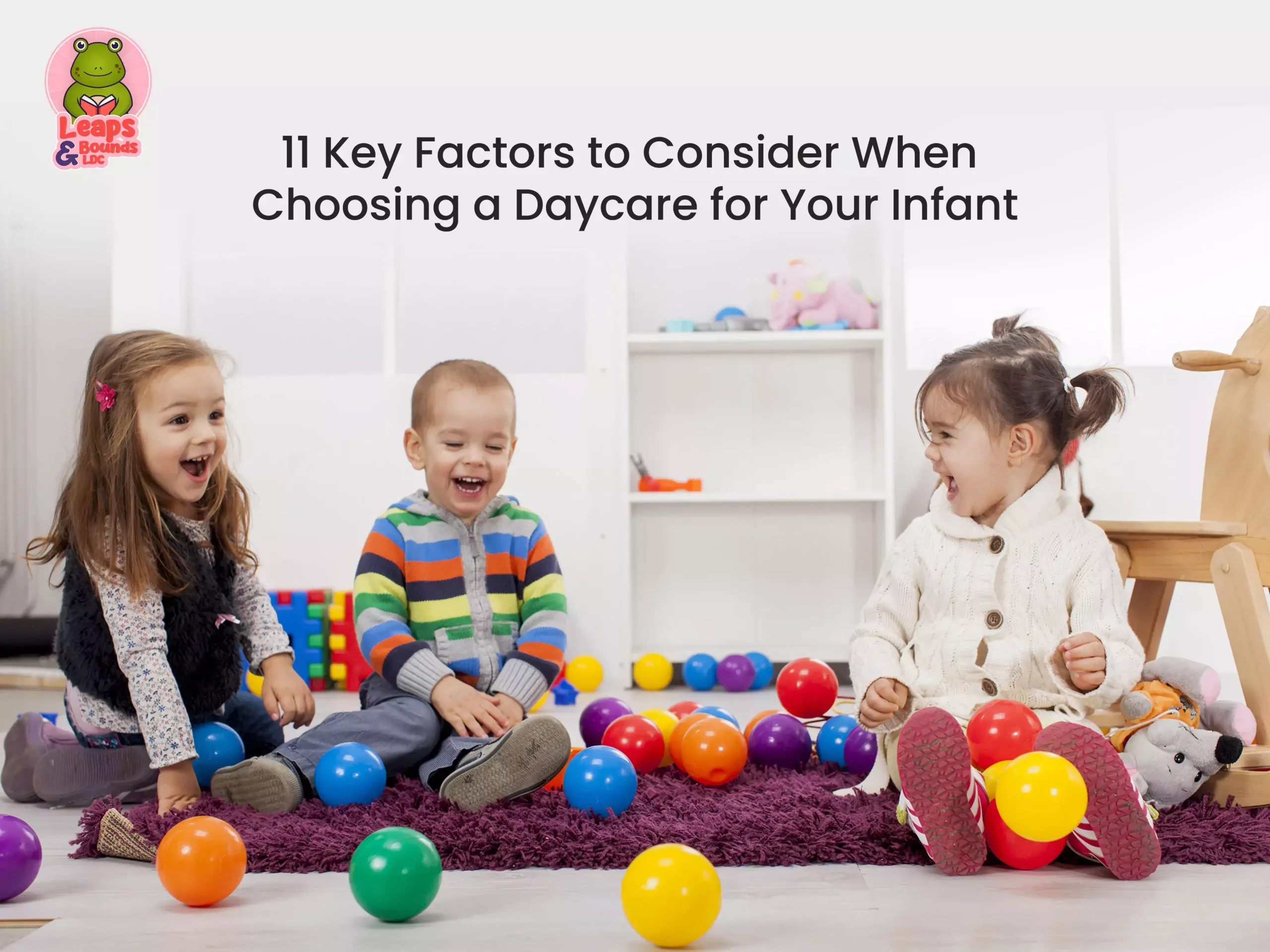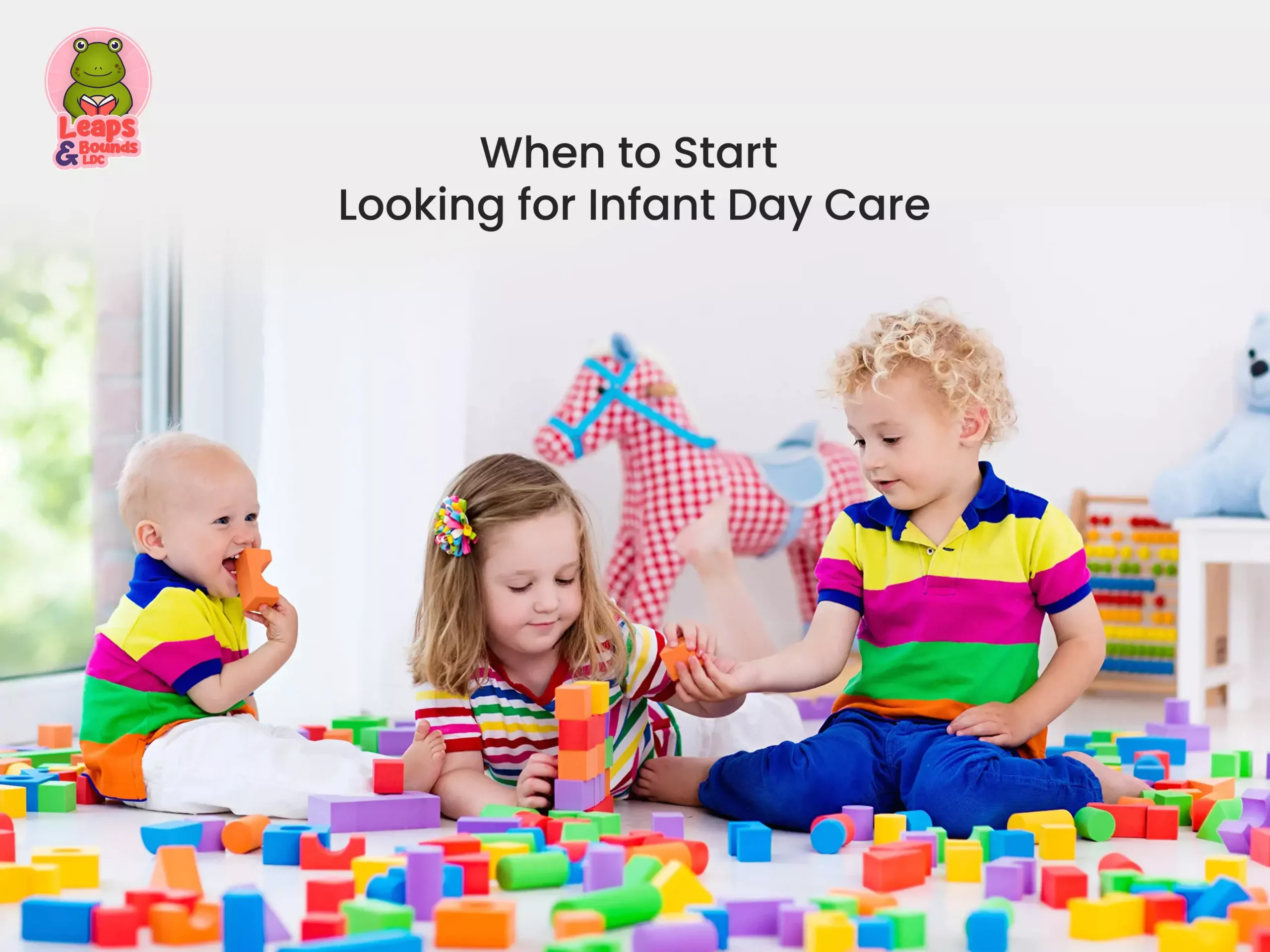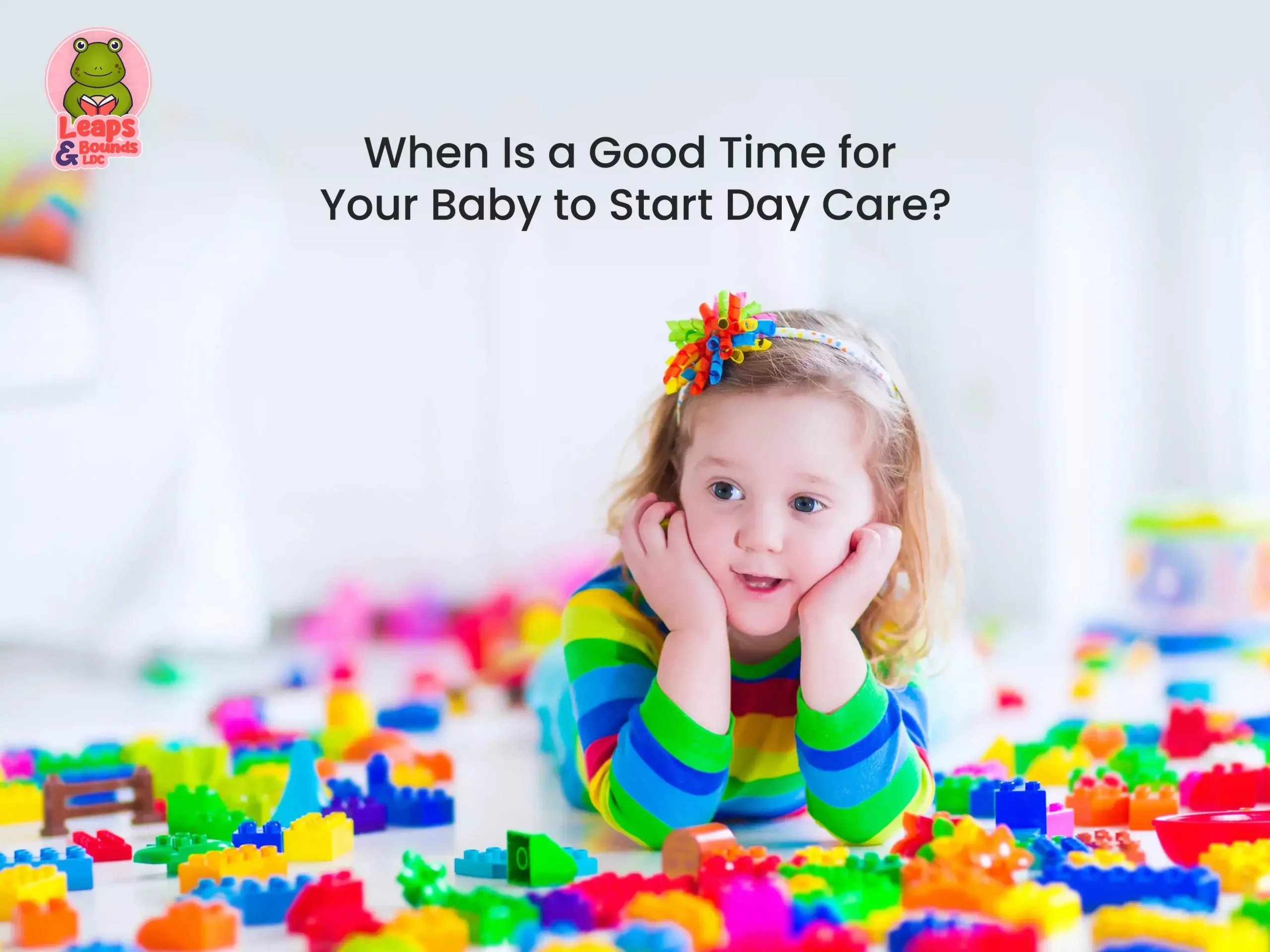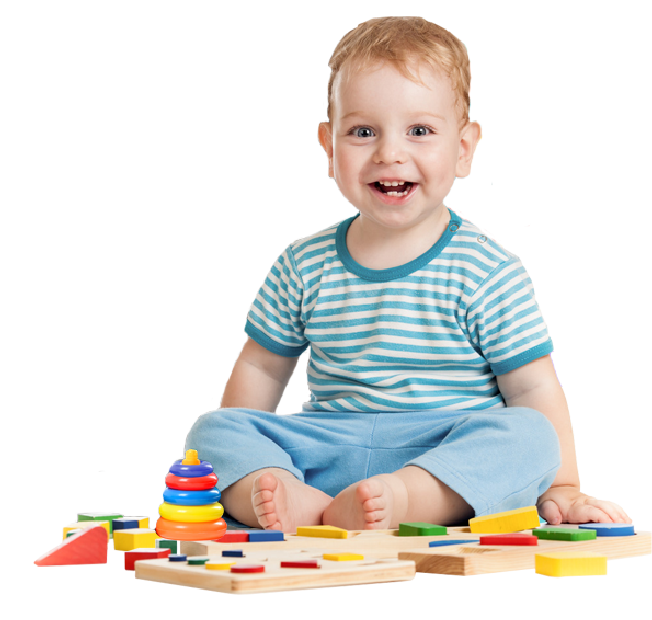Welcoming a new member into the family is a beautiful journey, and parents need to ensure their child’s well-being and development. When it comes to childcare options, selecting the ideal daycare for your child can be overwhelming. Every detail matters, from the care atmosphere to the safety standards.
This blog examines the art of making that vital decision. We’ll walk you through the essential elements to consider and offer you information to help you locate a daycare that fulfills your child’s needs while giving you peace of mind. Your child’s first steps deserve nothing less, and we’re here to help you walk them confidently.
11 Key Factors to Consider When Choosing a Daycare for Your Infant

Choosing childcare for your child necessitates serious consideration. Every factor, from safety to activities, is critical in their early growth.
In this section, we give the 11 most significant fundamental aspects that require your attention so that you can make an informed and conscientious decision regarding your child’s future.
Let’s look at the key factors to select the best daycare for toddlers.
-
Research and Gather Information
Selecting the baby’s daycare for your infant begins with thorough research and collecting information. Seek advice from friends, family, and internet platforms. Read reviews and testimonials to learn about other parents’ experiences. Inquire about programming, safety protocols, and staff qualifications with prospective daycare centers.
Prepare a list of questions for visits or phone conversations. This study will serve as the foundation for your search for the best care infant center, allowing you to make informed decisions that match your baby’s needs as well as the preferences of your family.
-
Clear and Consistent Guidelines
Give preference to facilities with clear and consistent criteria while considering care options for your child. These regulations include daily routines, safety standards, and communication methods. Transparent rules create a secure and safe environment for your child, where their well-being and growth are prioritized.
Inquire about napping, feeding schedules, and cleanliness routines. Clearly defined policies reflect the center’s professionalism and commitment to providing your child with a safe and comfortable environment. This clarity fosters confidence and lays a firm basis for your baby’s first encounters in their new nurturing environment.
-
Visit Potential Daycares
Visiting a possible infant nursery is essential in making an informed decision about your child’s custody. Visit the place in person to inspect it, meet the employees, and evaluate the facilities. Take note of the cleanliness, security measures, and general atmosphere. Make contact with caregivers to assess their interactions with youngsters.
Check if the daycare matches your child’s requirements and particular requests. These visits will offer you firsthand knowledge that will allow you to assess whether or not the daycare meets your expectations. During these visits, trust your instincts since they will provide crucial information to help you choose your child’s best nursing and care room.
-
Safety and Cleanliness
Consider the environment’s safety and cleanliness when looking for infant program daycare. Ensure the daycare follows proper hygiene practices, keeps spaces clean and disinfected, and adheres to safety protocols. Consider childproofing places, safe entrance points, and emergency procedures. To ensure individual attention, please inquire about the staff-to-child ratio.
A well-kept and secure environment provides a safe refuge for your youngster to explore and grow. Prioritizing safety and cleanliness builds trust, allowing you to entrust your baby’s care to a nursery that prioritizes the baby’s health, safety, and holistic development.
-
Learn about licensing
Understanding the daycare’s licensing is crucial in making your decision. Determine if the facility is licensed and regulated by the appropriate authorities. Licensing guarantees that safety standards, personnel certifications, and child-to-caregiver ratios are met. Check if the daycare is subjected to routine inspections to keep its certificate.
A licensed center demonstrates a dedication to following established rules and providing a safe and caring environment for your infant. You get peace of mind by investigating the facility’s licensing details, knowing that your child’s care is regulated by authorities who emphasize their well-being and developmental needs.
-
Caring and Qualified Caregivers
It is critical to select a daycare center with compassionate and qualified providers. Inquire about employee training, experience, and background checks. Qualified caregivers foster a nurturing environment and enhance your child’s development. Note how they connect with the youngsters and demonstrate patience and love.
An appropriate staff-to-child ratio ensures personal attention. Qualified caregivers understand developmental milestones and provide appropriate learning activities. Their emergency management knowledge is reassuring.
This will help parents looking for childcare. Choosing a daycare center with compassionate and knowledgeable caregivers will ensure your kid receives the attention and support they require during these formative years, paving the path for a healthy and enjoyable early childhood experience.
-
Ask about play and discipline
When looking for a childcare center for your child, inquire about their approach to play and discipline. Learn how they create a dynamic environment that supports your child’s exploration and learning via play. Find out what kinds of activities and toys are available.
It is also critical to discuss their disciplinary tactics. Instead of punitive methods, look for facilities emphasizing positive reinforcement and age-appropriate reorientation.
A daycare that promotes good play and reasonable discipline will assist your child in developing crucial social skills while making them feel comfortable and supported. This guarantees that their experiences are entertaining and helps them grow emotionally and behaviorally.
-
References and Reviews
When selecting a daycare center for your infant, consider the importance of recommendations and reviews—request recommendations from other parents or families who have used childcare services. Hearing about your experiences can be pretty beneficial. Examine online reviews and testimonials to determine overall satisfaction.
Positive evaluations frequently highlight the center’s strengths, while negative reviews may highlight areas of concern. This information will assist you in making the correct assessment. It will provide you with a clear understanding of how the daycare operates daily and how it fulfills your child’s care and development needs.
-
Trust Your Instincts
When selecting a nursery for your newborn, you must trust your intuition. In this decision-making process, your parental instinct is crucial. If something appears to be good, it is. Similarly, if you have any reservations, take them seriously.
Your intuition is vital to help you determine what is best for your child. While safety and qualifications are essential, your intuition adds a personal touch to your evaluation.
Combine your analytical analysis with your gut reactions to find a daycare that reflects your beliefs and provides a friendly and safe environment for your child’s development and happiness.
-
Research health and safety practices
It is critical to do a thorough review of a daycare’s health and safety policies. Inquire about their disease, vaccination, and emergency practices. Ensure they have proper hygiene practices, such as changing diapers and cleaning their hands. Examine the area’s cleanliness and child safety.
Check that there are transparent processes in place for pick-up and drop-off. Examine your employees’ first aid and CPR training. Choosing a nursery with solid health and safety procedures assures your child’s well-being. Extensive study in this area provides you confidence that your child will be secure and healthy while in your care.
-
Location and Convenience
The first consideration is the location and practicality of a daycare center. Choose a center that is convenient to your home or workplace. A shorter commute equals less stress and more time spent with your child. Consider parking and drop-off possibilities. It is also crucial to be close to emergency services.
Furthermore, the accessible location lets you become active with the childcare community and attend activities or meetings. Prioritizing both child care and work-life balance will improve your child’s experience and your peace of mind, making parenting and work-life balance more accessible and more manageable.
When to Start Looking for Infant Day Care

When looking for the best daycare for your child, planning ahead of time will ensure a smooth transition. To assist you in your quest, here is a timeline:
-
During Pregnancy: Research and Gather Information
Learn about your options for child care during your pregnancy. This gives you ample time to research, get recommendations, and organize visits.
-
Around 3-6 Months Before Returning to Work
As your due date approaches, reduce your options to a few recommended daycare facilities. Inquire with them about the application process and any waiting lists.
-
2-3 Months Before You Need Care
Complete your daycare selection and any relevant paperwork. This timing is a safety net in case your original choice is unavailable.
You may secure a place at a respected preschool by starting your search early, ensuring you and your kid have a comfortable and confident start to this new chapter.
When Is a Good Time for Your Baby to Start Day Care?

Consider your baby’s developmental needs as well as your circumstances when deciding when to enroll them in daycare:
-
Around 6-12 Weeks: Early Beginnings
If you return to work soon after giving birth, establishing childcare around weeks 6 to 12 can help you and your baby adjust smoothly.
-
3-6 Months: Building Routine
Babies become increasingly interactive at this stage. Starting childcare between the ages of three and six months allows kids to establish a routine and acclimate to social situations.
-
6-12 Months: Social Development
Babies are frequently more open to social interactions after six months. Starting child care at this age can aid their social and cognitive development.
-
Factors to Consider
Examine your work schedule, support system, and baby’s temperament. Trust your intuition and pick a time that works for your family to give your child a great childcare experience.
Find the Perfect Daycare for Your Infant Without the Headache
Visit Leaps and Bounds, the greatest in Summerville, South Carolina daycare. Finding the best childcare for your growing kid is critical; we are here to help you through the process.
Our daycare center provides excellent care and learning opportunities for newborns, toddlers, and preschoolers. We smoothly integrate education and enjoyment with a devoted team, age-appropriate activities, and a safe atmosphere. Our qualified experts offer a safe environment for your child’s protection.
Trust us to provide an enriching beginning to your child’s adventure and to set them up for success. Contact us for the best preschool and learning center experience in Summerville, SC.
Best Daycare for Infant FAQs:
-
What is the best age to put a baby in daycare?
Each family’s recommended age for placing a baby in daycare is different. In general, six to twelve months is a reasonable duration. This enables babies to acquire basic routines and early social skills.
However, the decision is influenced by parental requirements, the temperament of the baby, and the availability of support. When deciding on the optimal age to enroll a baby in daycare, examining individual circumstances and seeking specialist advice is critical.
-
Is it healthy for babies to go to daycare?
When babies are given quality care, daycare can benefit their health. It provides possibilities for social interaction, early learning, and a structured setting. It has the potential to boost emotional and cognitive growth.
However, the healthiness is determined by factors such as daycare quality, caregiver-to-child ratios, and the child’s specific requirements. A safe, nurturing, and exciting daycare environment is critical for a baby’s well-being.
To have a great experience, parents should thoroughly research and select daycare services, taking into account their child’s age and developmental stage.
-
Is it better for babies to be at home or in daycare?
Individual circumstances influence the decision between home care and daycare. Some parents prefer home care for newborns because it gives one-on-one attention and a familiar atmosphere.
Daycare, on the other hand, can provide possibilities for social contact and early learning. The ideal alternative may differ depending on parental job obligations, financial means, and the quality of available childcare.
Finally, whether at home or daycare, the most important thing is to provide a safe, caring, and stimulating environment that fits the baby’s needs and promotes healthy growth.
-
How do daycares take care of infants?
Daycares often provide a safe and supportive environment for infants. They have trained caretakers who attend to the basic requirements of newborns, such as feeding, diapering, and nap regimens.
Daycares frequently provide age-appropriate activities such as tummy time and sensory play to support early development. They give each newborn special attention, affection, and bonding time. Caregivers also inform parents about their child’s daily routines and developmental milestones.
A well-run daycare maintains a clean and secure environment, follows safety requirements, and provides a caring environment to assist infants’ growth and well-being.
-
Do babies develop faster in daycare?
Due to greater exposure to social contact and early learning activities, babies in daycare may develop faster in certain areas. Social and cognitive development can be aided by interaction with peers and caregivers.
Individual growth rates vary, and factors such as care quality and family environment also play important roles. While child care can provide excellent stimulation, remember that each child learns at his or her speed.
Parental involvement and a supportive home environment are essential for a child’s development.
Conclusion
In conclusion, when selecting the ideal daycare for your child, you should carefully examine variables such as safety, cleanliness, caregiver qualifications, and the environment’s nurturing ambiance.
Visiting potential daycare centers, asking questions, and getting recommendations are critical. Finally, the best option will fit your family’s needs and values, ensuring your child receives the caring, safe, and nurturing care they require to flourish.
Regular communication with caregivers and continuing assessment can also help to ensure your child’s well-being and growth throughout their care.



